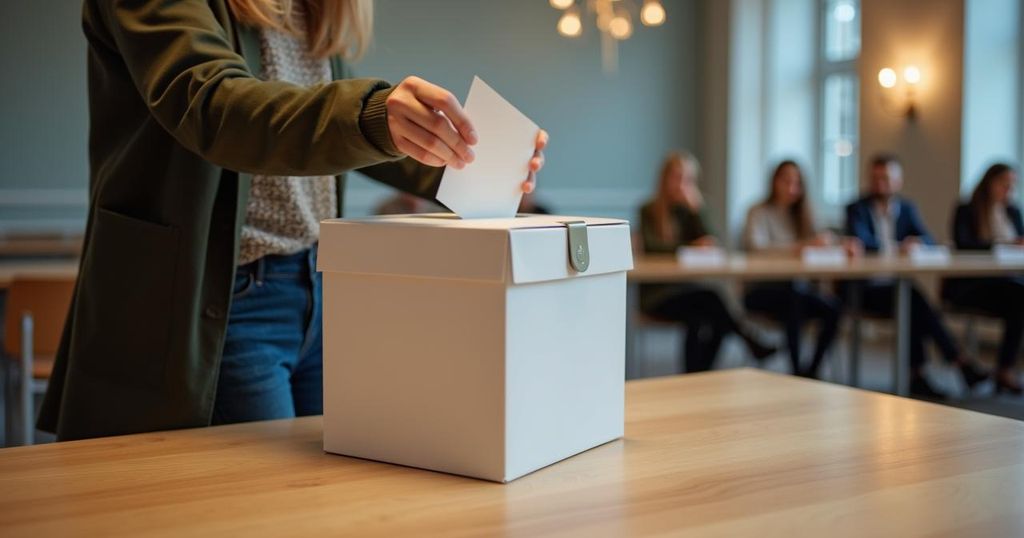Lithuania’s Parliamentary Elections: A Call for Change Amid Economic Stability
Lithuanians voted on Sunday in the first round of parliamentary elections, with the opposition Social Democrats and civic parties potentially poised to challenge the current center-right coalition. Despite strong economic metrics, widespread voter dissatisfaction due to pandemic measures and migration issues influence the political climate. Initial polls suggest a fragmented outcome necessitating coalition discussions, with sentiments of change prevalent among voters weary of the ruling party’s leadership.
Lithuania commenced its parliamentary elections on Sunday, marking the initial round amidst rising calls for change among voters, despite the country’s robust economic performance. The elections present an opportunity for the opposition Social Democrats and smaller center-left parties to potentially unseat the existing center-right coalition led by Prime Minister Ingrida Šimonytė, who assumed office in 2020. Although Lithuania, a member of the European Union, has experienced significant economic growth—reporting double-digit personal income growth and maintaining one of the lowest inflation rates among EU members—public sentiment reveals a pervasive sense of dissatisfaction. Political analyst Rima Urbonaitė from Mykolas Romeris University remarked, “There’s a lot of disappointment and discontent among voters. It is related to numerous crises and shocks and cannot be compensated by economic factors like positive change in purchasing power.” Criticism has been levied against Prime Minister Šimonytė regarding her government’s strict COVID-19 measures, with detractors highlighting the lack of adequate support for businesses during lockdowns and insufficient access to healthcare for many citizens. Furthermore, her administration has faced scrutiny for its management of migrant arrivals from Belarus, with allegations that both Belarus and Russia have been orchestrating the influx of individuals primarily hailing from Africa and the Middle East. Recent opinion polls conducted by Vilmorus indicate a strong showing for the Social Democratic Party, led by Vilija Blinkevičiūtė, with projections suggesting they may achieve twice the votes of Šimonytė’s Homeland Union. Meanwhile, the newly established right-wing party Nemuno Aušra, helmed by Remigijus Žemaitaitis, embroiled in controversy due to previous antisemitic remarks, is anticipated to secure a substantial fraction of the electorate. Complications arise as no party is expected to gain more than 20 percent of the popular vote, necessitating coalition negotiations for any party seeking to govern. The Social Democrats have excluded the possibility of forming an alliance with Žemaitaitis’s group, suggesting that a coalition involving three or four smaller centrist parties will be essential. Voter sentiments reflect this desire for change; one lifelong conservative voter expressed, “Šimonytė and the entire Homeland Union look battered, worn out and they would better spend some time on the spare bench.” Analysts suggest that even with a potential leftward shift in power, significant alterations to Lithuania’s foreign policy are unlikely, especially given the current geopolitical landscape influenced by Russia’s actions in Ukraine. The driving force behind foreign policy direction is primarily influenced by the country’s president, currently Gitanas Nauseda, who successfully secured a second term earlier this year. Lithuania will elect a total of 141 parliamentary members for a four-year term, with 2.4 million eligible voters participating in the elections. The first round will decide 70 lawmakers through party lists, while a subsequent runoff will take place on October 27 to finalize candidates for single-member constituencies.
The parliamentary elections in Lithuania, scheduled for two rounds, occur in a context where voters express a desire for political change despite the nation’s economic upswing. Analytical perspectives shed light on the public’s feelings of disenchantment with the current government’s handling of various crises, including the COVID-19 pandemic and the challenges posed by immigration. The complex political landscape, characterized by the necessity for coalition-building, offers insight into the evolving dynamics of Lithuanian politics and governance.
In conclusion, Lithuania’s inaugural round of parliamentary elections signifies a pivotal moment in the nation’s political landscape, characterized by widespread public desire for change despite strong economic indicators. The potential for a shift in power to the Social Democrats and other center-left entities underscores the challenges faced by the current administration and reflects broader voter sentiment. As the elections progress, the implications for coalition dynamics and foreign policy remain of critical importance, particularly in light of regional tensions.
Original Source: www.pbs.org




Post Comment